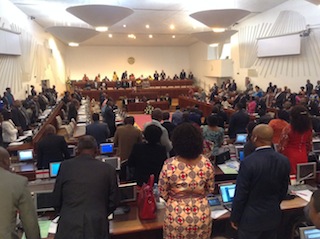Mozambique: Forty detained during post-election protests just freed in Beira
Decentralised elected provincial governing bodies will have less money than current provincial governments

Picture: A Verdade
In addition to little political power, the future provincial decentralised governing bodies to be elected on 15 October, unlike the provincial governors currently appointed by the central executive, will have a spending limit indexed to their number of inhabitants and their territorial area.
All parliamentary benches of the Assembly of the Republic generally approved, by “consensus”, the law that defines the financial and patrimonial regime of the Provincial Decentralised Governing Bodies this Wednesday (24-07).
The new law confers the necessary administrative autonomy on future provincial governments, but @Verdade understands that in practical terms it holds them hostage to the Central Executive since, although they can approve their budgets and business plans, they cannot contradict the Economic and Social Plan nor the National State Budget that is set by the party that wins the presidential election, and they will be subject to the ministry that oversees planning and finance.
Another thing that @Verdade has found will further minimize the role of future provincial assemblies and provincial governors is that the revenue they will receive from the state budget of the party that wins the presidential election is limited to the number of provincial inhabitants and respective territorial area.

Currently, provincial governments receive from the State Budget funds for their operation and investments that have no legal limit depending only on the wishes of the ruling party. For example, in 2019 Gaza Province has an allocation of 3.4 billion meticais, far more than neighbouring Inhambane Province. Cabo Delgado’s provincial expenditure was set at 4.2 billion meticais, surpassing the province of Zambezia which has an allocation of 4 billion meticais.
Although the new law provides for the possibility for provincial decentralised governing bodies to obtain their own revenues through license fees, service fees or fines imposed for violations of regulations, the truth is that the collection will be minimal, as has proved the case with the municipalities.
By contrast, state representatives will continue to enjoy unlimited budgets depending on the strategies of the ruling party.
By Adérito Caldeira












Leave a Reply
Be the First to Comment!
You must be logged in to post a comment.
You must be logged in to post a comment.